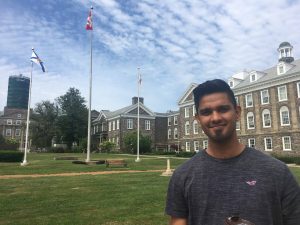Maritime climate, local hospitable dwellers and affordable living price are essential reasons for immigrants who decide to settle down in Nova Scotia rather than other provinces. Since 2014, the number of Permanent Resident (PR) nominees has doubled in Nova Scotia from 630 to 1,350. In 2016, the number grew to 1,383 nominees.
According to the Labour Market Classification of Nominees, in the last five years the lead job for newcomers working in Nova Scotia is cooking, which accounts for 7 per cent of the total labour market. Food service supervisors is the second choice, accounting for 6 per cent. Computer programming, and software engineering both come in as the third choice, each taking up 5 per cent of all immigrants’ occupations.
From 2011 to 2016, the Nova Scotian population rose by a mere 0.6 per cent, with 949,5000 people in the province. This is lower than the national average at 1.2 per cent. To combat this, last year Nova Scotia government kicked off several programs to bring in more immigrants like Stay in Nova Scotia, which helps international students stay after graduating, and Atlantic Immigration Pilot, which is an employer-driven immigration program between Government of Canada and the four Atlantic Provinces.
Pranav Sharma, an Indian student in the computer networks masters program at Dalhousie University, plans to take part in the Atlantic Immigration Pilot next year.

“Computer science is the first preference for students in India” says Sharma. “After the Common Entrance Exam, only top students are able to enter computer science programs in India.”
However, Sharma says if Indian students want further and more specific study, they have to turn to countries like the United States and Canada.
“Though the bachelor courses are very good (in India), for the Masters, colleges are very few,” admits Sharma.
Sharma says he has a student loan issued by a bank in India. If he gets back to India, he needs to work seven or eight years to pay it off. However, if he works in Canada, it may only take him two years. The PR visa will allow him stay here and work.
According to the 2016 skill level criteria by the National Occupational Classification (NOC), if computer science students like Sharma successfully get university degrees, including bachelor’s, master’s or doctorate, and find a relative job, their skill level is graded as ‘A’- professional jobs.
“As soon as you have your permanent residency, like a landed immigrant, you can register here as our client for free,” says Josephine Chica, who works for Immigrant Services Association of Nova Scotia (ISANA). “If you are looking for a job, tell us. ISANA offers workshops on resumes, cover letters and networking.”
Chica was originally from Philippines and lives in Halifax with her two children. She used to be a client in ISANA and got her citizenship in 2015.
“Nationally, it is clear that Asian countries dominate immigrant source countries. This is the case across [labour market] categories…” and has remained consistent over time, says the 2016 annual report from Immigrant Services Association of Nova Scotia.
For most Chinese people, a good way to start their lives in Canada is running a restaurant. Jane Fan, a Dalhousie student studying electronic business, is the co-owner of Panda Buffet, a Chinese restaurant in Bedford. She decided to become a co-owner in 2016 as an investment.
“If they want to put what they’ve learnt into practice, to stay here and make living, an easy way is starting a food business, or taking over a restaurant”, says Fan. “You can see there are a lot of restaurants in Halifax being run by Chinese, even some are Japanese sushi restaurants or Thai food restaurants.”
Like Fan, a big proportion of Chinese students in Canada are studying business. She is currently applying for the PR visa as her common-law partner who has been working in Halifax for more than one year. Fan says she will be satisfied with the PR visa and has no desire for citizenship in Canada, or she will lose her Chinese citizenship.
